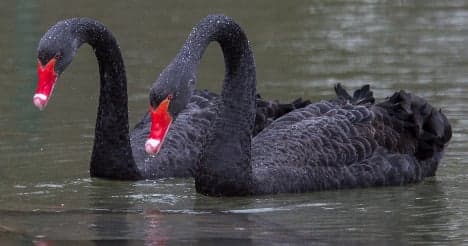Zoos show off animal lovebirds for Valentine crowds

Zoos across Germany are trying to tempt visitors in this Valentine's weekend with information about the love life of animals – but there's plenty of interesting facts amid the marketing.
Some zoos are even offering whole packages including champagne or mulled wine to complete the loved-up atmosphere.
 Two Nyala antelopes 'kissing' in Munich zoo. Photo: DPA
Two Nyala antelopes 'kissing' in Munich zoo. Photo: DPA
"We want to show something about the biological background of behaviour," Nuremberg Zoo educator Christian Dienemann said. "It shouldn't be a lot of hot air, nor deadly serious, but with a wink."
 Humboldt penguins cleaning one another in Bremerhaven zoo. Photo: DPA
Humboldt penguins cleaning one another in Bremerhaven zoo. Photo: DPA
Penguins are perhaps the best-known monogamous animals, sometimes even sticking with one partner for life. And they show much more courtship behaviour at the beginnings of relationships than when raising children later.
"Like an old married couple," Dienemann said.
 Two red flamingos in Munich Zoo. Photo: DPA
Two red flamingos in Munich Zoo. Photo: DPA
Meanwhile, flamingos use highly ritualized touching behaviours in their courtships. "One could say that they dance," Dienemann explained, as individuals seek out a partner who can match their sense of rhythm.
 A Pygmy marmoset carries its child on its back. Photo: DPA
A Pygmy marmoset carries its child on its back. Photo: DPA
And pygmy marmosets from South America – the world's smallest true apes – always have twins when they reproduce. The mothers don't do anything for their young but nurse them, with the men taking on the rest of the childrearing.
 Two lions in Münster Zoo. Photo: DPA
Two lions in Münster Zoo. Photo: DPA
Lions, meanwhile, are well-known for their ferocity in mating just as much as in the hunt.
Pairs get together for a few days while the females are in heat, mating up to 50 times a day – or every 15 minutes.
"As a human being, you can absolutely ask whether you would enjoy that too," Dienemann acknowledged.
SEE ALSO: 7 songs to make your German lover swoon on Valentine's
Comments
See Also
Some zoos are even offering whole packages including champagne or mulled wine to complete the loved-up atmosphere.
 Two Nyala antelopes 'kissing' in Munich zoo. Photo: DPA
Two Nyala antelopes 'kissing' in Munich zoo. Photo: DPA
"We want to show something about the biological background of behaviour," Nuremberg Zoo educator Christian Dienemann said. "It shouldn't be a lot of hot air, nor deadly serious, but with a wink."
 Humboldt penguins cleaning one another in Bremerhaven zoo. Photo: DPA
Humboldt penguins cleaning one another in Bremerhaven zoo. Photo: DPA
Penguins are perhaps the best-known monogamous animals, sometimes even sticking with one partner for life. And they show much more courtship behaviour at the beginnings of relationships than when raising children later.
"Like an old married couple," Dienemann said.
 Two red flamingos in Munich Zoo. Photo: DPA
Two red flamingos in Munich Zoo. Photo: DPA
Meanwhile, flamingos use highly ritualized touching behaviours in their courtships. "One could say that they dance," Dienemann explained, as individuals seek out a partner who can match their sense of rhythm.
 A Pygmy marmoset carries its child on its back. Photo: DPA
A Pygmy marmoset carries its child on its back. Photo: DPA
And pygmy marmosets from South America – the world's smallest true apes – always have twins when they reproduce. The mothers don't do anything for their young but nurse them, with the men taking on the rest of the childrearing.
 Two lions in Münster Zoo. Photo: DPA
Two lions in Münster Zoo. Photo: DPA
Lions, meanwhile, are well-known for their ferocity in mating just as much as in the hunt.
Pairs get together for a few days while the females are in heat, mating up to 50 times a day – or every 15 minutes.
"As a human being, you can absolutely ask whether you would enjoy that too," Dienemann acknowledged.
SEE ALSO: 7 songs to make your German lover swoon on Valentine's
Join the conversation in our comments section below. Share your own views and experience and if you have a question or suggestion for our journalists then email us at [email protected].
Please keep comments civil, constructive and on topic – and make sure to read our terms of use before getting involved.
Please log in here to leave a comment.